Some Days in Upper Egypt (March 2001)
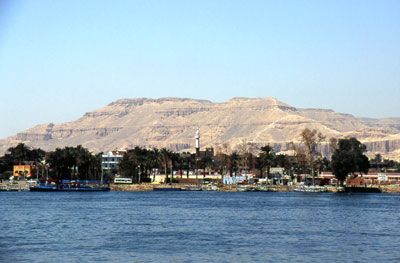
In springtime 2001 I went to Upper Egypt for about one week. In difference to the well prearranged and longterm travels I generally prefer, this trip
comes more or less surprisingly. A friend of mine got some holidays left from the year before and were looking at the web fro some cheap flight to
a sunny country. Accidentally we met, and I've got one week left too... The flight departed from Munich to Hurghada and was run by tour operator FTI.
We arrived in the afternoon and were looking for the hotel recommended by a friend first. We quickly got the same price as he did, although I had to learn
that bargaining is essential in Egypt to get moderate prices. At all further accomodations, we spent much less consequently. It became clear,
that my trips to India were a good school for bargaining, most notably since the baksheesh principle was in common use in Egypt as well as in India.
Furthermore it is from great importance to have lots of loose money although these are usually banknotes - otherwise it is not possible to get
fair prices. It does not matter if you are paying a taxi driver, the bus or some food at a street hawker, you will need it anyway.
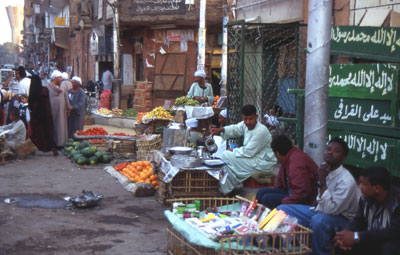
Especially if paying in taxis or in mini busses it is more easy to hand out some small money even if one does not know the exact fare, usually
that works fine. It is recommendable to look what the Egyptians are paying even if this needs some time, but acting that way will bring you some
undertanding of the usual prices. Hurghada itself is a boring place at the end of the dessert mostly covered by hotels. There is no need, in my opinion,
for staying longer than necessary, even though Hurghada is situated by the Red Sea. Therefore we left the town the next morning for Luxor by public bus.
But, the evening we used to walk around in the local neighbourhoods outside the hotel areas, and suddenly there was some flair in the streets.
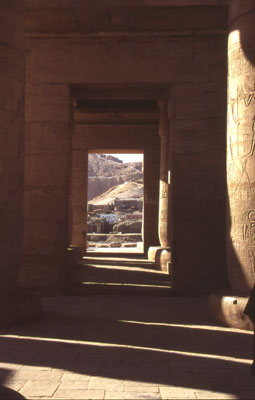
Nevertheless, one thing comes already to the fore - although many many tourists are visting Egypt every year, the country is rather poor. There
were a lot of places reminding me for the situation in India. Probably one reason is the steadily as well as strongly growing population, which mostly
lives along the Nile River and in the coastal regions. Only a small population is able to get feed by the desert - and Egypt is largely consisting of
dessert areas.
The bus to Luxor arrived 20 minutes late the next day, but taking into account the already covered distance to Suez it was no heavy delay.
The bus journey reminded me one more time to India and South East Asia - as well as in these regions a film was shown, but nobody was reallly
interested in. Nevertheless, loudness was at maximum level. The journey itself was rather boring since the landscape was almost all just desert.
Therefore I used the time for learning arabic numbers using the distance signs along the street.
The landscape abruptly changed with reaching the course of the Nile River - suddenly, everything was green and fresh, at least some hundred meters to the
left and right of the river. At Luxor bus station, a lot of haulers already were waiting, trying to catch some people for any hotel. Since there is hardly
a way to get rid of them we decided to get served by the most quietly of them. But, he made a stop after s short ride. Since this stop took too
much time we decided to choose one of the hotels jsut at this place, which resulted in noisy complaints of the driver.
After the end of this discussion and after storing our belongings in the hotel room we walked to the famous Luxor Temple.
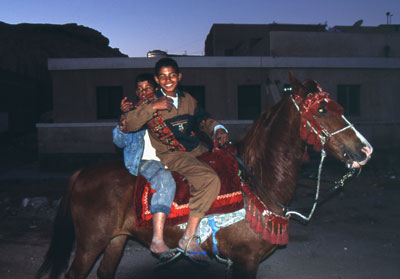
Indeed a very impressing building, especially
if one takes care for the age of it. It is relly amazing that everything survived time in such good state. But, the temple was covered by sand for some centuries,
which of course preserved the building. From that period counts a rarity - the constructors of a mosque probably were surprised from a flagstone
in the ground which they quickly used as the mosque's base plate. And now, if you are looking to one edge from inside the temple, there is
a mosque build above which looks really quaint. In summary, the temple is more than worth a visit - but this becomes valid for all other places we
should visit too.
After being there, we walked through the city, or more exactly the large market along the streets. We could prevent bying some of the mostly useless
things, even if special priced "only for you..." by the sellers. But, finally we visited a papyrus workshop, basically just for looking aroung.
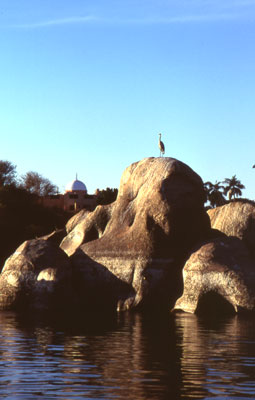
And the owner was both, friendly as well as very smart. Of course he offered some tea, and further he explained how papyrus is made and how
the prices are set up. If he was talking the truth, tourists coming along with guides pay most money. In the end, we bought some papyrus paintings -
but I am not able to say if they were cheap or not. Here, only the philosophy of India may help - you buy something for a price which a thing seems
worth to be for you... In the evening, we walked to the other great temple of Luxor. But, the Karnak Temple is used for Sound and Light Shows during the evenings,
which equals to an entrance ticket of 33 Egyptian Pounds. I hope, that a part of this money is used for reconstruction of the ancient buildings.
The show itself was not bad, especially if also some historical facts were presented.
After having a long sleep the next morning (during the night, our sleep was suddenly disrupted by neighboring islamic school, thus always have
a look if there are some loudspeakers or minarettes nearby your hotel!), we crossed the Nile for Theben-West to visit the valley of kings.
It is absolutely adequate to use the regular ferry boats, as well as it is not really necessary to hire a taxi for the full day at the other
riverside. This will take at least 50 Pounds which could be saved, although it is not possible to go all the way without any transportation due
to the larger distances.
For us it worked to get a taxi at the place of need, even if we had to wait for a couple of minutes. Moreover, there are some kind of mini busses as well,
but nobody will probably tell you. But, it is not a problem to get collected by them. Altogether it works pretty good, with exception at the
gates of the valley of kings - here, it becomes more expensive. Nevertheless, first you will need a taxi for the way to the entrance of the ancient sites...
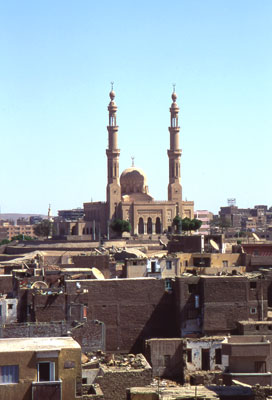
Our first place to go was the impressive Hatshepsut Temple, from where we walked across the hills to the valley of kings. Although it might be hot,
the way is more or less equal. Up the hill you have a wonderfool view across the valley and the desert, furthermore there is a police station there.
As we realized not without reason since the police men started to haunt some guys which were following us almost immediately - whatever kind
of people they may have been...
In the valley of kings it became really hot, and it went even worse while visiting the burial chambers. There are only a few opened for the public, most
probably because the large number of visitors cause a high humidity in the burial chambers which is very harmfull for the wall paintings there.
Our last station was the so-called Ramasseum, and here we were almost the only ones. Back in Luxor we looked for a restaurant offering egyptian
cuisine, which I strongly recommend for a try.
The next day we took a bus for Assuan some hundred kilometres south, and here we realized that the Nile Region is somehwat overpopulated - the bus was just
cram-full. Not that perfect for a journey of about 4 hours, but I found a place at the stairs in the front of the bus with a nice view around.
Concerning Assuan - I really liked that town, it was much more authentic than Luxor, even though I can not tell why exactly. We found a reasonably
priced hotel with a small swimming pool at the roof - good for cool down as well as having a great view over the town and the possibility
to enjoy the fantastic sunsets.
There are a lot of things to see and to do in and around Assuan, and we got four days left.
Recommendable is taking a Feluka (a traditional sailing boat) for a day to go up-stream the Nile River. Here, there are a number of islands which
you can easily access.
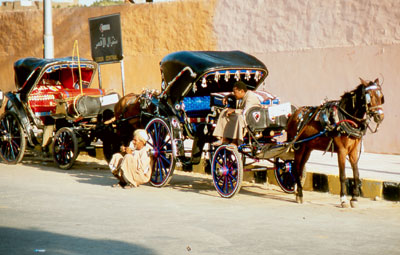
One may get at least a small impression of the live of the nubian people within small settlements, and from the small hills you have
a very nice view across the Nile Valley, the cataracts and the first barrage (yes, there are two - the usually known Highdam and the smaller
dam some kilometres downstream constructed by the Englishman from 1898 till 1902). In the evening the landscape shows very beautifull colours,
providing some magical touch. Another option is to cross the Nile and doing some Camel ride through the near desert - but do not expect long-distance
rides. Probably a must see is a visit of the highdam nearby Assuan, which is impressive only by the giant size of the building. It is a good choice to
combine a visit of the remarkable Philae Temples. These are found at a small island in the part of the Nile in between the two dams. Originally,
the buildings were found up at another island which was flooded after the construction of the old barrage. Therefore, the temples were disjointed in some
ten thousands of pieces and built up again at another island. Another must see, in my opinion, is Elephantine Island just opposite the city of
Assuan.
To go there, one does not need a Feluka with it sometimes importunate skippers - one of the two regular ferries does the same thing faster and
for less money.
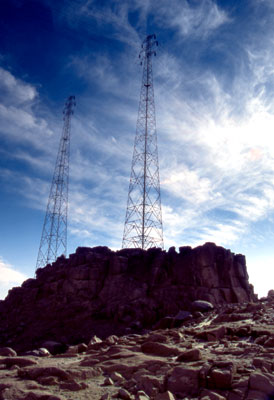
If you once at the island, you may think you are in completely another place. The main part is full of green plants, there are some gardens
and some small villages, and it is quiet! At the south point of the island is an archaelogical site - the island is inhabited now since 4000 BC. The place
which is now Assuan was the port only for a long period. Finally, one should not miss long walks through the town to see how the people are living.
This is much better than the short visits as in case of arriving at one of the cruise ships.
Unfortunately, time vanished and we had to return to Hurghada Airport. We decided to take the bus at 3pm (our flight left 2am the next day), and where
asked by some astonished Englishmen how we got a bus ticket. For them, it was necessary to go to the tourist police... In general, there is a lot of
tourist police, and many foreigners consider this as a grant for safety. I feel a bit controverse since I think, that nobody will pay a lot of security guards
without a given necessity - just remember the assassination of the tourists near Hatshepsut Temple in 1997.
We finally arrived in Hurghada with a app. 90 minutes delay after one police check during the journey. At Hurghada bus station we had a little discussion with
the taxi drivers about our fare to the airport, but due to the help of one guard of the tourist police we got our prefered price. The arrival at the airport was
something shocking - due to heavy rainfalls in Germany the flight crew already exceeded their allowed number of hours worked and therefore the flight was
delayed for the next day. Bad luck for people like us which only booked the flight. Although the airline has to provide an accomodation in this case,
it took a number of phone calls, some hours and the help of an airport officer to finally get a bed for sleeping. In the end, we arrived back in Germany the next
days evening after surviving a thundering chaos at the airport of Hurghada...
back
 In springtime 2001 I went to Upper Egypt for about one week. In difference to the well prearranged and longterm travels I generally prefer, this trip
comes more or less surprisingly. A friend of mine got some holidays left from the year before and were looking at the web fro some cheap flight to
a sunny country. Accidentally we met, and I've got one week left too... The flight departed from Munich to Hurghada and was run by tour operator FTI.
We arrived in the afternoon and were looking for the hotel recommended by a friend first. We quickly got the same price as he did, although I had to learn
that bargaining is essential in Egypt to get moderate prices. At all further accomodations, we spent much less consequently. It became clear,
that my trips to India were a good school for bargaining, most notably since the baksheesh principle was in common use in Egypt as well as in India.
Furthermore it is from great importance to have lots of loose money although these are usually banknotes - otherwise it is not possible to get
fair prices. It does not matter if you are paying a taxi driver, the bus or some food at a street hawker, you will need it anyway.
In springtime 2001 I went to Upper Egypt for about one week. In difference to the well prearranged and longterm travels I generally prefer, this trip
comes more or less surprisingly. A friend of mine got some holidays left from the year before and were looking at the web fro some cheap flight to
a sunny country. Accidentally we met, and I've got one week left too... The flight departed from Munich to Hurghada and was run by tour operator FTI.
We arrived in the afternoon and were looking for the hotel recommended by a friend first. We quickly got the same price as he did, although I had to learn
that bargaining is essential in Egypt to get moderate prices. At all further accomodations, we spent much less consequently. It became clear,
that my trips to India were a good school for bargaining, most notably since the baksheesh principle was in common use in Egypt as well as in India.
Furthermore it is from great importance to have lots of loose money although these are usually banknotes - otherwise it is not possible to get
fair prices. It does not matter if you are paying a taxi driver, the bus or some food at a street hawker, you will need it anyway.
 Especially if paying in taxis or in mini busses it is more easy to hand out some small money even if one does not know the exact fare, usually
that works fine. It is recommendable to look what the Egyptians are paying even if this needs some time, but acting that way will bring you some
undertanding of the usual prices. Hurghada itself is a boring place at the end of the dessert mostly covered by hotels. There is no need, in my opinion,
for staying longer than necessary, even though Hurghada is situated by the Red Sea. Therefore we left the town the next morning for Luxor by public bus.
But, the evening we used to walk around in the local neighbourhoods outside the hotel areas, and suddenly there was some flair in the streets.
Especially if paying in taxis or in mini busses it is more easy to hand out some small money even if one does not know the exact fare, usually
that works fine. It is recommendable to look what the Egyptians are paying even if this needs some time, but acting that way will bring you some
undertanding of the usual prices. Hurghada itself is a boring place at the end of the dessert mostly covered by hotels. There is no need, in my opinion,
for staying longer than necessary, even though Hurghada is situated by the Red Sea. Therefore we left the town the next morning for Luxor by public bus.
But, the evening we used to walk around in the local neighbourhoods outside the hotel areas, and suddenly there was some flair in the streets.
 Nevertheless, one thing comes already to the fore - although many many tourists are visting Egypt every year, the country is rather poor. There
were a lot of places reminding me for the situation in India. Probably one reason is the steadily as well as strongly growing population, which mostly
lives along the Nile River and in the coastal regions. Only a small population is able to get feed by the desert - and Egypt is largely consisting of
dessert areas.
The bus to Luxor arrived 20 minutes late the next day, but taking into account the already covered distance to Suez it was no heavy delay.
The bus journey reminded me one more time to India and South East Asia - as well as in these regions a film was shown, but nobody was reallly
interested in. Nevertheless, loudness was at maximum level. The journey itself was rather boring since the landscape was almost all just desert.
Therefore I used the time for learning arabic numbers using the distance signs along the street.
The landscape abruptly changed with reaching the course of the Nile River - suddenly, everything was green and fresh, at least some hundred meters to the
left and right of the river. At Luxor bus station, a lot of haulers already were waiting, trying to catch some people for any hotel. Since there is hardly
a way to get rid of them we decided to get served by the most quietly of them. But, he made a stop after s short ride. Since this stop took too
much time we decided to choose one of the hotels jsut at this place, which resulted in noisy complaints of the driver.
After the end of this discussion and after storing our belongings in the hotel room we walked to the famous Luxor Temple.
Nevertheless, one thing comes already to the fore - although many many tourists are visting Egypt every year, the country is rather poor. There
were a lot of places reminding me for the situation in India. Probably one reason is the steadily as well as strongly growing population, which mostly
lives along the Nile River and in the coastal regions. Only a small population is able to get feed by the desert - and Egypt is largely consisting of
dessert areas.
The bus to Luxor arrived 20 minutes late the next day, but taking into account the already covered distance to Suez it was no heavy delay.
The bus journey reminded me one more time to India and South East Asia - as well as in these regions a film was shown, but nobody was reallly
interested in. Nevertheless, loudness was at maximum level. The journey itself was rather boring since the landscape was almost all just desert.
Therefore I used the time for learning arabic numbers using the distance signs along the street.
The landscape abruptly changed with reaching the course of the Nile River - suddenly, everything was green and fresh, at least some hundred meters to the
left and right of the river. At Luxor bus station, a lot of haulers already were waiting, trying to catch some people for any hotel. Since there is hardly
a way to get rid of them we decided to get served by the most quietly of them. But, he made a stop after s short ride. Since this stop took too
much time we decided to choose one of the hotels jsut at this place, which resulted in noisy complaints of the driver.
After the end of this discussion and after storing our belongings in the hotel room we walked to the famous Luxor Temple.
 Indeed a very impressing building, especially
if one takes care for the age of it. It is relly amazing that everything survived time in such good state. But, the temple was covered by sand for some centuries,
which of course preserved the building. From that period counts a rarity - the constructors of a mosque probably were surprised from a flagstone
in the ground which they quickly used as the mosque's base plate. And now, if you are looking to one edge from inside the temple, there is
a mosque build above which looks really quaint. In summary, the temple is more than worth a visit - but this becomes valid for all other places we
should visit too.
After being there, we walked through the city, or more exactly the large market along the streets. We could prevent bying some of the mostly useless
things, even if special priced "only for you..." by the sellers. But, finally we visited a papyrus workshop, basically just for looking aroung.
Indeed a very impressing building, especially
if one takes care for the age of it. It is relly amazing that everything survived time in such good state. But, the temple was covered by sand for some centuries,
which of course preserved the building. From that period counts a rarity - the constructors of a mosque probably were surprised from a flagstone
in the ground which they quickly used as the mosque's base plate. And now, if you are looking to one edge from inside the temple, there is
a mosque build above which looks really quaint. In summary, the temple is more than worth a visit - but this becomes valid for all other places we
should visit too.
After being there, we walked through the city, or more exactly the large market along the streets. We could prevent bying some of the mostly useless
things, even if special priced "only for you..." by the sellers. But, finally we visited a papyrus workshop, basically just for looking aroung.
 And the owner was both, friendly as well as very smart. Of course he offered some tea, and further he explained how papyrus is made and how
the prices are set up. If he was talking the truth, tourists coming along with guides pay most money. In the end, we bought some papyrus paintings -
but I am not able to say if they were cheap or not. Here, only the philosophy of India may help - you buy something for a price which a thing seems
worth to be for you... In the evening, we walked to the other great temple of Luxor. But, the Karnak Temple is used for Sound and Light Shows during the evenings,
which equals to an entrance ticket of 33 Egyptian Pounds. I hope, that a part of this money is used for reconstruction of the ancient buildings.
The show itself was not bad, especially if also some historical facts were presented.
After having a long sleep the next morning (during the night, our sleep was suddenly disrupted by neighboring islamic school, thus always have
a look if there are some loudspeakers or minarettes nearby your hotel!), we crossed the Nile for Theben-West to visit the valley of kings.
It is absolutely adequate to use the regular ferry boats, as well as it is not really necessary to hire a taxi for the full day at the other
riverside. This will take at least 50 Pounds which could be saved, although it is not possible to go all the way without any transportation due
to the larger distances.
For us it worked to get a taxi at the place of need, even if we had to wait for a couple of minutes. Moreover, there are some kind of mini busses as well,
but nobody will probably tell you. But, it is not a problem to get collected by them. Altogether it works pretty good, with exception at the
gates of the valley of kings - here, it becomes more expensive. Nevertheless, first you will need a taxi for the way to the entrance of the ancient sites...
And the owner was both, friendly as well as very smart. Of course he offered some tea, and further he explained how papyrus is made and how
the prices are set up. If he was talking the truth, tourists coming along with guides pay most money. In the end, we bought some papyrus paintings -
but I am not able to say if they were cheap or not. Here, only the philosophy of India may help - you buy something for a price which a thing seems
worth to be for you... In the evening, we walked to the other great temple of Luxor. But, the Karnak Temple is used for Sound and Light Shows during the evenings,
which equals to an entrance ticket of 33 Egyptian Pounds. I hope, that a part of this money is used for reconstruction of the ancient buildings.
The show itself was not bad, especially if also some historical facts were presented.
After having a long sleep the next morning (during the night, our sleep was suddenly disrupted by neighboring islamic school, thus always have
a look if there are some loudspeakers or minarettes nearby your hotel!), we crossed the Nile for Theben-West to visit the valley of kings.
It is absolutely adequate to use the regular ferry boats, as well as it is not really necessary to hire a taxi for the full day at the other
riverside. This will take at least 50 Pounds which could be saved, although it is not possible to go all the way without any transportation due
to the larger distances.
For us it worked to get a taxi at the place of need, even if we had to wait for a couple of minutes. Moreover, there are some kind of mini busses as well,
but nobody will probably tell you. But, it is not a problem to get collected by them. Altogether it works pretty good, with exception at the
gates of the valley of kings - here, it becomes more expensive. Nevertheless, first you will need a taxi for the way to the entrance of the ancient sites...
 Our first place to go was the impressive Hatshepsut Temple, from where we walked across the hills to the valley of kings. Although it might be hot,
the way is more or less equal. Up the hill you have a wonderfool view across the valley and the desert, furthermore there is a police station there.
As we realized not without reason since the police men started to haunt some guys which were following us almost immediately - whatever kind
of people they may have been...
In the valley of kings it became really hot, and it went even worse while visiting the burial chambers. There are only a few opened for the public, most
probably because the large number of visitors cause a high humidity in the burial chambers which is very harmfull for the wall paintings there.
Our last station was the so-called Ramasseum, and here we were almost the only ones. Back in Luxor we looked for a restaurant offering egyptian
cuisine, which I strongly recommend for a try.
The next day we took a bus for Assuan some hundred kilometres south, and here we realized that the Nile Region is somehwat overpopulated - the bus was just
cram-full. Not that perfect for a journey of about 4 hours, but I found a place at the stairs in the front of the bus with a nice view around.
Concerning Assuan - I really liked that town, it was much more authentic than Luxor, even though I can not tell why exactly. We found a reasonably
priced hotel with a small swimming pool at the roof - good for cool down as well as having a great view over the town and the possibility
to enjoy the fantastic sunsets.
There are a lot of things to see and to do in and around Assuan, and we got four days left.
Recommendable is taking a Feluka (a traditional sailing boat) for a day to go up-stream the Nile River. Here, there are a number of islands which
you can easily access.
Our first place to go was the impressive Hatshepsut Temple, from where we walked across the hills to the valley of kings. Although it might be hot,
the way is more or less equal. Up the hill you have a wonderfool view across the valley and the desert, furthermore there is a police station there.
As we realized not without reason since the police men started to haunt some guys which were following us almost immediately - whatever kind
of people they may have been...
In the valley of kings it became really hot, and it went even worse while visiting the burial chambers. There are only a few opened for the public, most
probably because the large number of visitors cause a high humidity in the burial chambers which is very harmfull for the wall paintings there.
Our last station was the so-called Ramasseum, and here we were almost the only ones. Back in Luxor we looked for a restaurant offering egyptian
cuisine, which I strongly recommend for a try.
The next day we took a bus for Assuan some hundred kilometres south, and here we realized that the Nile Region is somehwat overpopulated - the bus was just
cram-full. Not that perfect for a journey of about 4 hours, but I found a place at the stairs in the front of the bus with a nice view around.
Concerning Assuan - I really liked that town, it was much more authentic than Luxor, even though I can not tell why exactly. We found a reasonably
priced hotel with a small swimming pool at the roof - good for cool down as well as having a great view over the town and the possibility
to enjoy the fantastic sunsets.
There are a lot of things to see and to do in and around Assuan, and we got four days left.
Recommendable is taking a Feluka (a traditional sailing boat) for a day to go up-stream the Nile River. Here, there are a number of islands which
you can easily access.
 One may get at least a small impression of the live of the nubian people within small settlements, and from the small hills you have
a very nice view across the Nile Valley, the cataracts and the first barrage (yes, there are two - the usually known Highdam and the smaller
dam some kilometres downstream constructed by the Englishman from 1898 till 1902). In the evening the landscape shows very beautifull colours,
providing some magical touch. Another option is to cross the Nile and doing some Camel ride through the near desert - but do not expect long-distance
rides. Probably a must see is a visit of the highdam nearby Assuan, which is impressive only by the giant size of the building. It is a good choice to
combine a visit of the remarkable Philae Temples. These are found at a small island in the part of the Nile in between the two dams. Originally,
the buildings were found up at another island which was flooded after the construction of the old barrage. Therefore, the temples were disjointed in some
ten thousands of pieces and built up again at another island. Another must see, in my opinion, is Elephantine Island just opposite the city of
Assuan.
To go there, one does not need a Feluka with it sometimes importunate skippers - one of the two regular ferries does the same thing faster and
for less money.
One may get at least a small impression of the live of the nubian people within small settlements, and from the small hills you have
a very nice view across the Nile Valley, the cataracts and the first barrage (yes, there are two - the usually known Highdam and the smaller
dam some kilometres downstream constructed by the Englishman from 1898 till 1902). In the evening the landscape shows very beautifull colours,
providing some magical touch. Another option is to cross the Nile and doing some Camel ride through the near desert - but do not expect long-distance
rides. Probably a must see is a visit of the highdam nearby Assuan, which is impressive only by the giant size of the building. It is a good choice to
combine a visit of the remarkable Philae Temples. These are found at a small island in the part of the Nile in between the two dams. Originally,
the buildings were found up at another island which was flooded after the construction of the old barrage. Therefore, the temples were disjointed in some
ten thousands of pieces and built up again at another island. Another must see, in my opinion, is Elephantine Island just opposite the city of
Assuan.
To go there, one does not need a Feluka with it sometimes importunate skippers - one of the two regular ferries does the same thing faster and
for less money.
 If you once at the island, you may think you are in completely another place. The main part is full of green plants, there are some gardens
and some small villages, and it is quiet! At the south point of the island is an archaelogical site - the island is inhabited now since 4000 BC. The place
which is now Assuan was the port only for a long period. Finally, one should not miss long walks through the town to see how the people are living.
This is much better than the short visits as in case of arriving at one of the cruise ships.
Unfortunately, time vanished and we had to return to Hurghada Airport. We decided to take the bus at 3pm (our flight left 2am the next day), and where
asked by some astonished Englishmen how we got a bus ticket. For them, it was necessary to go to the tourist police... In general, there is a lot of
tourist police, and many foreigners consider this as a grant for safety. I feel a bit controverse since I think, that nobody will pay a lot of security guards
without a given necessity - just remember the assassination of the tourists near Hatshepsut Temple in 1997.
We finally arrived in Hurghada with a app. 90 minutes delay after one police check during the journey. At Hurghada bus station we had a little discussion with
the taxi drivers about our fare to the airport, but due to the help of one guard of the tourist police we got our prefered price. The arrival at the airport was
something shocking - due to heavy rainfalls in Germany the flight crew already exceeded their allowed number of hours worked and therefore the flight was
delayed for the next day. Bad luck for people like us which only booked the flight. Although the airline has to provide an accomodation in this case,
it took a number of phone calls, some hours and the help of an airport officer to finally get a bed for sleeping. In the end, we arrived back in Germany the next
days evening after surviving a thundering chaos at the airport of Hurghada...
If you once at the island, you may think you are in completely another place. The main part is full of green plants, there are some gardens
and some small villages, and it is quiet! At the south point of the island is an archaelogical site - the island is inhabited now since 4000 BC. The place
which is now Assuan was the port only for a long period. Finally, one should not miss long walks through the town to see how the people are living.
This is much better than the short visits as in case of arriving at one of the cruise ships.
Unfortunately, time vanished and we had to return to Hurghada Airport. We decided to take the bus at 3pm (our flight left 2am the next day), and where
asked by some astonished Englishmen how we got a bus ticket. For them, it was necessary to go to the tourist police... In general, there is a lot of
tourist police, and many foreigners consider this as a grant for safety. I feel a bit controverse since I think, that nobody will pay a lot of security guards
without a given necessity - just remember the assassination of the tourists near Hatshepsut Temple in 1997.
We finally arrived in Hurghada with a app. 90 minutes delay after one police check during the journey. At Hurghada bus station we had a little discussion with
the taxi drivers about our fare to the airport, but due to the help of one guard of the tourist police we got our prefered price. The arrival at the airport was
something shocking - due to heavy rainfalls in Germany the flight crew already exceeded their allowed number of hours worked and therefore the flight was
delayed for the next day. Bad luck for people like us which only booked the flight. Although the airline has to provide an accomodation in this case,
it took a number of phone calls, some hours and the help of an airport officer to finally get a bed for sleeping. In the end, we arrived back in Germany the next
days evening after surviving a thundering chaos at the airport of Hurghada...
